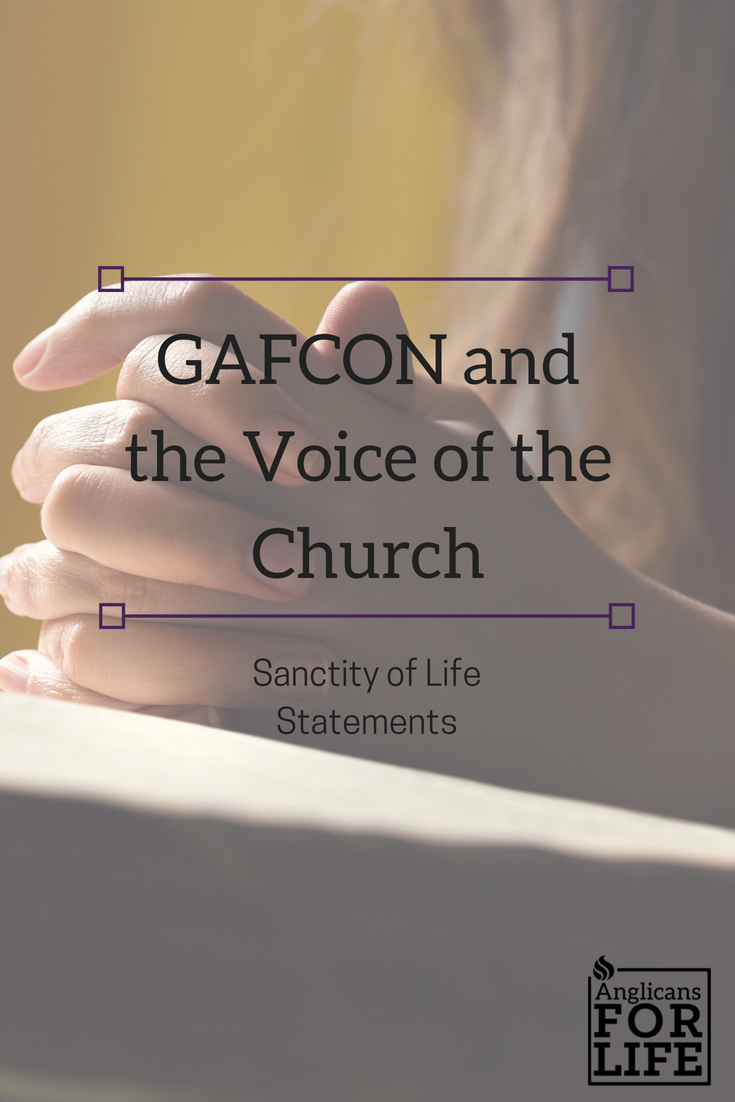In June of this year, AFL President Georgette Forney traveled to Jerusalem for the 2018 GAFCON assembly. The purpose of the gathering is to retain and restore the Bible to the heart of the Church and to share the unchanging Gospel of salvation through Jesus Christ. Georgette was honored to be invited, as well as to host an exhibit table and teach a workshop. She also thought it was an amazing and encouraging event and wonderful ti me of Christian fellowship with life-affirming believers.
me of Christian fellowship with life-affirming believers.
Still, even though we at AFL knew that the GAFCON leaders were friendly to the message of Life, it was heartening to read this statement from the 2018 GAFCON Assembly Letter to the Churches:
“Yet faithful proclamation of this gospel is under attack from without and within, as it has been from apostolic times…Secularism seeks to exclude God from all public discourse and to dismantle the Christian heritage of many nations. This has been most obvious in the redefinition of what it means to be human…The devaluing of the human person through the advocacy of abortion and euthanasia is also an assault upon human life uniquely created in the image of God.”
There is little doubt that the Scriptures proclaim the sacredness of life in every chapter and on every page. But we can’t help but to be encouraged seeing the larger Church confirming it in such a direct and incontrovertible way. But the statement from the 2018 GAFCON letter is not the only life-affirming statement made by members of the larger Anglican communion:
Anglican Church of North America – Constitution and Canons 2017
God, and not man, is the creator of human life. The unjustified taking of life is sinful. Therefore, all members and clergy are called to promote and respect the sanctity of every human life from conception to natural death. (Title II, Section 3)
Anglican Catholic Church – Canons of the Anglican Catholic Church 2007
The defenselessness of the unborn entails a great responsibility on the part of every Christian, and especially on the part of each of his or her parents. The deliberate and willful abortion, directly procured, of any unborn child at any time from the moment of conception, is always an act of grave sin not only by the person who procures the same, but also by such person or persons who effectuate the same or acquiesce therein.
Euthanasia is Murder. This Church reaffirms that it is the Lord Who is the Giver of Life, and that the willful, intentional, and direct taking of any innocent human life is murder, whether disguised as “euthanasia”, or mercy-killing,” or under any other name. (Title XV, Canon 1)
Reformed Episcopal Church – 46th General Council of Reformed Episcopal Church 1990
RESOLVED, that we, the Reformed Episcopal Church, vigorously affirm the biblical teaching of the sanctity of human life, and deplore the practice of permitting abortions, with the possible exception of cases where it has been clearly established that the life of the mother is in danger.*
Anglican Church in America – Affirmation of St. Louis – 1977
Every human being, from the time of his conception, is a creature and child of God, made in His image and likeness, an infinitely precious soul; and that the unjustifiable or inexcusable taking of life is always sinful.
But what do these statements mean exactly? Why are they so important?
Anglicans follow and honor statements and creeds. Many Anglicans recite the Nicene Creed every Sunday and use the litanies and liturgies from the Book of Common Prayer. These pre-written prayers and creeds guide worship, remind us of the truth found in Scripture, and reinforce the Anglican Communion’s understanding and purpose in Jesus Christ. But therein lies the importance—prayers and creeds are not just a matter of tradition; they are guidelines, based on Scripture’s teaching, of how Anglicans should believe and how her people must act in faith. So, in a tradition based on the importance of statements, the sanctity of life statements are crucial, because they serve as guidelines concerning how Anglicans must value, protect, and serve Life. The wider Anglican Communion, despite different traditions and denominations, has made her position known—and how her people should take action.
May these sanctity of life statements leap off the physical page and work in our hearts and minds. May they guide our steps as we seek to protect the unborn, the elderly, and the vulnerable.
Written by AFL Administrator Robin Ferguson
*Anglicans for Life does not endorse abortion under any circumstances but agrees with the spirit of the REC’s resolution.
